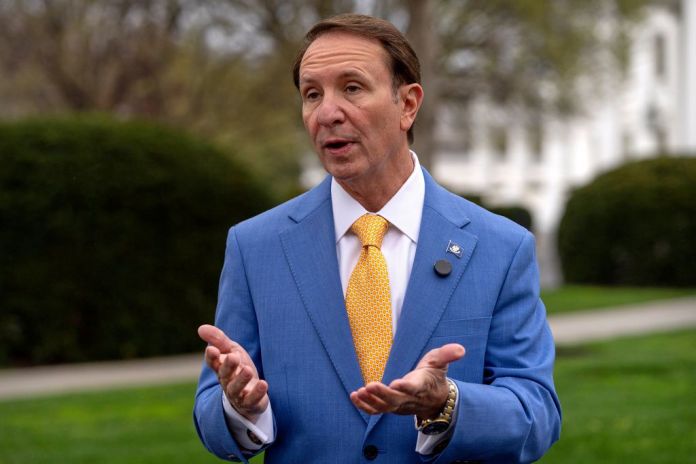Kamala Harris, unburdened by what has been her record – Washington Examiner
The article discusses Vice President Kamala Harris’s evolving public narrative as she embarks on her presidential campaign. It highlights her efforts to revise the public perception of her past policies while navigating the media landscape, particularly surrounding her controversial tenure as “border czar.” The narrative examines how sympathetic media outlets have begun retroactively altering their portrayals of her, assisting in reshaping her image by downplaying previous positions on issues like fracking and immigration, framing her shifts as responses to criticisms rather than admissions of misstep.
The article also mentions the strategic advantages Harris may gain by avoiding a competitive primary process, allowing her to focus on crafting a general election platform that aligns more closely with popular appeal rather than engaging in extensive promises to specific party factions. It highlights the challenges that come with such a strategy, particularly the risk of her past positions being scrutinized differently compared to other politicians, such as former President Donald Trump.
Harris’s campaign appears to be constructed on a blend of distancing herself from her controversial past while presenting a new narrative that positions her as a candidate focused on the future—a move that echoes the broader Democratic strategy of balancing traditional party issues with more centrist appeals.
Kamala Harris, unburdened by what has been her record
The border czar flap was just the beginning.
Vice President Kamala Harris is carefully editing the public record to excise inconvenient parts of her time serving with President Joe Biden and the more controversial policy positions she took in her first run for the White House.
Sympathetic media have been willing to aid in this effort, retroactively correcting years-old references to Harris as border czar in their own reporting and contextualizing her discarded policy positions as the product of a progressive Democratic fever in 2019-20 that has since broken.
One news report about Harris’s revised position on fracking initially framed it as a response to a Republican accusation rather than a Harris reversal. (The headline was later updated.) Another lamented the “border confusion” that “haunts” Harris since she effectively took over as the top of the 2024 Democratic ticket.
Some in the liberal intelligentsia go further, arguing that an inherent advantage of bypassing a competitive, small-d democratic primary process this time around means that a new platform can be fashioned for the general election only.
“But I think the merit of skipping a primary is that you don’t need to make huge public promises to your base groups,” the liberal pundit Matthew Yglesias writes. “You need to write down a brief, realistic agenda of items the public wants to hear about.”
Yglesias put it another way on X, the social media platform formerly known as Twitter: “By skipping a primary you can skip the part of the election where you make lots of explicit cringey promises to various elements of your base and just write down a few popular issues to run on and tell everyone else to be chill.”
“Chill” in what way? Harris “should send a quiet emissary to the immigration advocacy community to tell them not to be idiots, that if a bipartisan comprehensive immigration reform bill passes Congress, she’s obviously not going to veto it…. Was she the ‘border czar?’ Who cares!”
It is fine for liberal commentators to advise Harris to adopt this type of messaging. It is significantly more problematic for straight news outlets to allow Harris to flip-flop and memory-hole unpopular or too-radical positions while not allowing former President Donald Trump or Sen. J.D. Vance (R-OH) similar latitude with theirs.
Trump can repeatedly disavow Project 2025 or federal abortion bans less easily than Harris can distance herself from past advocacy for the Green New Deal, Medicare for All, decriminalizing border crossings, or banning fracking.
On abortion in particular, Trump clearly did try to avoid “explicit cringey promises to various elements of” his “base and just write down a few popular issues to run on and tell everyone else to be chill.” The 2024 Republican platform was rewritten accordingly, largely urging states to use the powers they regained when Roe v. Wade was reversed to ban late-term abortions.
None of this will prevent Harris from making abortion access one of the top issues in her campaign to defeat Trump this November.
Campaigns are indeed about the future. Past records are nevertheless an important indicator of what is to come.
Harris is trying to run less as a continuation of Biden or the liberal alternative to him she presented herself as in her failed first presidential campaign than as a California prosecutor throwing the book at felon Trump. The references to her being unburdened by what has been or having just fallen out of a coconut tree are already cliches a little over a week into her campaign, yet both catchphrases are apt metaphors for her campaign strategy.
In some ways, this is a type of continuity with Biden. Biden spent a half-century trying to find the center of gravity inside the Democratic Party and position himself accordingly. Harris’s campaign so far is following in that tradition.
Republicans for decades ran to the right in primaries and then tacked to the center for the general election. It is part of why the party became so disenchanted with its leaders and governing class.
But the last Republican presidential nominee before Trump, Mitt Romney, did end up paying a political price for adopting a slightly different persona in each race he ran for a quarter century. “Look, I was an independent during the time of Reagan-Bush. I’m not trying to take us back to Reagan-Bush,” Romney said in his first campaign, the 1994 Senate race against Ted Kennedy in Massachusetts. Romney capped his political career with a single Senate term representing Utah, being hailed as one of the last Reaganites standing.
The Romney “Etch-a-Sketch” was not a winning model in 2012 because the media, his opponents, and his own base would not let him get away with it. Harris may not be burdened by such things.
" Conservative News Daily does not always share or support the views and opinions expressed here; they are just those of the writer."




